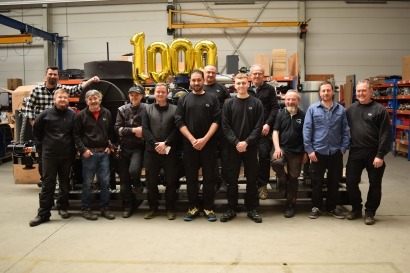
"The technology of wood gasification is not new and goes back well over 80 years. In pre-war times, for example, there were already vehicles that ran on wood gas. But the challenge was to develop the technology further so that you have a decentralized energy plant with a controllable firebed that supplies electricity and heat whenever it is needed. Which is a big advantage over solar or wind energy, both of which are weather dependent," explains Thomas Bleul, CEO of Spanner Re² GmbH.
"Our Berta, as we named our first plant in 2008, was the foundation stone of our now globally deployed biomass power plants," Bleul reports.
He adds that there is still a little bit of "Berta" in every plant, because the compact glow bed, which is operated in direct current mode, is still retained today.
"Comfort, performance and the use of alternative fuels have, of course, been continuously expanded over the years," Bleul adds.
And very successfully, because the medium-sized company is one of the world's leading manufacturers in its sector and has set standards on the wood gasifier market with the new generations of wood gasifiers, such as the top seller "HKA 70".
Biomass power plants from Re² in operation worldwide: company focus on residual material utilization Re²'s biomass power plants are in operation all over the world and are characterized by above-average running times and high fuel flexibility.
Re² plants generate electricity and heat as needed from wood residues, for example from industrial processing or thinning as well as from roadside greenery. This makes the plants particularly sustainable and optimizes the value chain of many companies whose wooden residues often have to be disposed of at a cost.
Re² offers plant sizes for almost every area of application From 35 kW to several megawatts electric, the company offers energy solutions - and that, from the individual plant to the complete solution including peripherals such as fuel drying, discharge and conveyor technology, wood gasification unit and suitable large CHP as well as intelligent control technology.
Last year, for example, a 1.8 MW wood gas project was implemented in Japan, where the heat produced by the biomass power plant is used to supply the greenhouses of a major corporation. The company supplies households in the region with the electricity generated.
The 1000th plant left the factory of Spanner Re² in May and will go into operation in the Bavarian region. The customer, a large dairy from the Allgäu region, will in future be completely self-sufficient in terms of energy for its production facility with the help of 12 biomass power plants from Re².
Around 50 percent of the electricity will be used by the company itself, and the rest will be paid for in accordance to the German CHP law. The heat is used as process heat in the plant, which means that the customer receives a process heat subsidy on its investment. Another great benefit of the system is that, thanks to the modular plant design, there is a continuous energy supply, even during maintenance activities that can be carried out in parallel.

